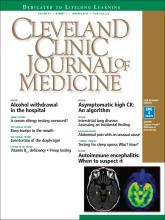Review
Approach to asymptomatic creatine kinase elevation
Siamak Moghadam-Kia, MD, Chester V. Oddis, MD and Rohit Aggarwal, MD, MS
Cleveland Clinic Journal of Medicine January 2016, 83 (1) 37-42; DOI: https://doi.org/10.3949/ccjm.83a.14120
Siamak Moghadam-Kia
Division of Rheumatology and Clinical Immunology, University of Pittsburgh School of Medicine; VA Pittsburgh Healthcare System, Pittsburgh, PA
Chester V. Oddis
Division of Rheumatology and Clinical Immunology, University of Pittsburgh School of Medicine, Pittsburgh, PA
Rohit Aggarwal
Associate Professor of Medicine, Division of Rheumatology and Clinical Immunology, University of Pittsburgh School of Medicine, Pittsburgh, PA
In this issue
Cleveland Clinic Journal of Medicine
Vol. 83, Issue 1
1 Jan 2016
Approach to asymptomatic creatine kinase elevation
Siamak Moghadam-Kia, Chester V. Oddis, Rohit Aggarwal
Cleveland Clinic Journal of Medicine Jan 2016, 83 (1) 37-42; DOI: 10.3949/ccjm.83a.14120
Jump to section
Related Articles
Cited By...
- Epigenetic Age Monitoring in Professional Soccer Players for Tracking Recovery and the Effects of Strenuous Exercise
- Inflammatory Neuropathy in Mouse and Primate Models of Colorectal Cancer
- Elevated aminotransferases in a 62-year-old woman
- Influenza-induced rhabdomyolysis
- PFN2 and GAMT as common molecular determinants of axonal Charcot-Marie-Tooth disease
- CKing Precision in the Interpretation of Diagnostic Biomarkers






